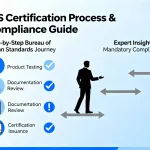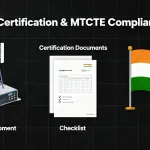New in the world of the automobile Industry? Finding it difficult to get an AIS certificate for your product? Let EiKomp help you!
In the dynamic world of the automotive industry, ensuring safety, compliance, and standardization is of paramount importance. This is where AIS (Automotive Industry Standard) certification plays a pivotal role.
AIS certification is a mandatory conformity assessment process defined by the Automotive Industry Standards Committee (AISC) under the aegis of the Ministry of Road Transport and Highways (MoRTH) in India. It ensures that vehicles, components, and systems conform to the prescribed safety and environmental standards.
How does an AIS certificate change the dynamics?
Enhancing Road Safety: Road safety is a primary concern in any country, and India is no exception. AIS certification ensures that vehicles meet stringent safety standards, reducing the risk of accidents and injuries on the road.
Standardization and Quality Assurance: AIS certification facilitates standardization across the automotive industry. It ensures that vehicles and their components adhere to specified technical requirements and quality benchmarks. This helps maintain consistency and reliability in vehicle manufacturing, leading to better products for consumers.
Global Competitiveness: AIS certification aligns Indian automotive standards with global benchmarks, making it easier for Indian manufacturers to compete in international markets.
Consumer Confidence: AIS certification instills confidence in consumers regarding the safety and quality of vehicles they purchase. It assures them that the vehicle they choose has met rigorous testing and evaluation, thereby enhancing their trust in the automotive industry.
The AIS Certification Process:
The AIS certification process involves several stages, including testing, documentation, and evaluation. Here is a brief overview of the typical steps involved:
- Test Facilities: Testing is conducted in authorized testing facilities approved by the AISC and accredited by the National Accreditation Board for Testing and Calibration Laboratories (NABL).
- Documentation: Manufacturers must submit detailed technical documentation, including design drawings, specifications, test reports, and compliance statements.
- Testing and Evaluation: Vehicles or components undergo comprehensive testing to verify compliance with AIS standards. This includes safety tests, performance evaluations, emissions testing, and more.
- Certification Issuance: Upon successful completion of the testing process, the AISC grants the AIS certificate, affirming compliance with the relevant standards.
AIS certification is a vital regulatory framework that ensures safety, standardization, and quality in India’s automotive industry. By enforcing compliance with AIS standards, the certification enhances road safety, boosts consumer confidence, and facilitates global competitiveness for Indian manufacturers.
As the Indian automobile sector continues to grow and expand its global footprint, AIS certification remains a crucial aspect of the industry’s success and development.
Remember, EiKomp is here to assist you with navigating the complex landscape of regulatory technology (RegTech) and compliance. Contact us to explore how our solutions can streamline your certification processes and ensure adherence to AIS standards, empowering your automotive business to thrive in a rapidly evolving industry.





